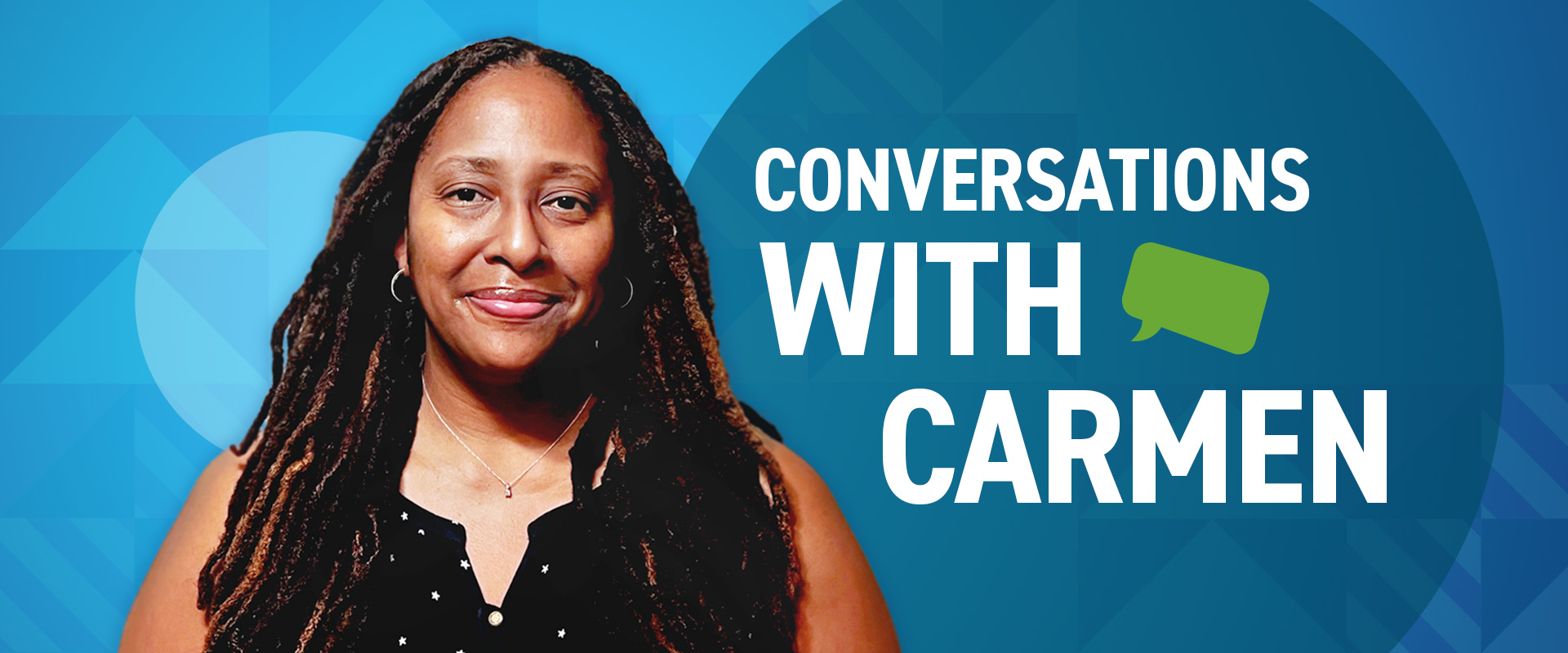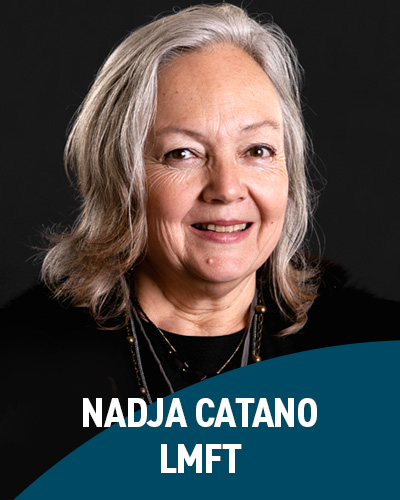

From Patient to Therapist
Carmen Explores Nadja’s Lifetime of Perspective

Hear what Dr. Carmen Majied learned when she sat down with Nadja Catano to get an in depth look at the important life events that were long term catalysts in Nadja’s eventual career path. Carmen digs below the surface to discover who Nadja is on a personal level and how it molded her into the therapist she is today.
You shared that you are originally from Brazil and lived there until the age of 7. How would you say relocating to another country at a young age impacted your sense of self and your ability to navigate change?
Moving from an environment where I was part of weekly family get-togethers with grandparents, aunts, uncles, and also seeing my two cousins regularly, being with both sides of my family, to a place where it was our nuclear family consisting of my mom and dad, sister, and myself was lonely and affected my sense of belonging: when we went back three years later for a visit, I was an “American” over there, speaking my native language (Portuguese) with an accent, though I wasn’t “American” here: I didn’t belong neither here nor there, I saw. I don’t like changes that happen to me.
How would you say your extensive background volunteering for La Leche League as a breastfeeding counselor contributed to your interest in becoming a licensed helping professional?
The psychological aspects of mother-baby bonding throughout gestation (maybe even conception), parturition, and lactation that are influenced by the physiological changes were fascinating to me from the beginning. I read all I could about mothering experiences and how we grow and mature spiritually and psychologically through this. Through the chapter of LLL that I was involved in, I had the opportunity to learn Human Relations Enrichment (HRE) which was communication skills, and I took the courses every time they were offered, 1-2 times a year. The emphasis was on empathetic listening and peaceful conflict resolution. Another LLL Leader, who was an LMFT, observed my communication skills in one of these courses, and strongly encouraged me to pursue this profession.
Are there any noteworthy aspects of your personal history that contributed to your desire to seek a career as a clinician?
I was a troubled youth, a delinquent, from the age of 12. I’ve had personal experience with two dozen clinicians for my own therapy.
You shared that you work with clients of various ages and backgrounds. You specifically made mention of the adolescent/teenage, individuals in recovery as well as the 'betrayed spouse' (both partners and children included) populations. What about each of those populations intrigues you?
Personal experience with the issues gives me perspective to share with clients. Also, healing entails seeing both sides compassionately.
How would your family and friends describe you?
Bold and stubborn.
What do you think your mission in life is?
To welcome and allow others to be as they are, with appropriate limits.
How many languages do you speak?
I speak one fluently, English, my second language, which I now speak better than my first, Portuguese, though I can still carry a conversation in it, barely. I speak very broken Spanish, and am learning a little German, Danish, Czech, and Japanese.
You shared that you completed basic training in EMDR. What about that specific approach captivated you to the point of seeking training in it?
I appreciated the nonverbal aspect of the healing, and my role as therapist in facilitating the brain’s natural capacity to metabolize traumatic memories and heal itself. In one of my therapies, I experienced EMDR myself, with appreciable changes in my own physiological reactivity.
What is your primary theoretical orientation? What perspective do you conceptualize your clients from?
Primarily from a humanistic approach, with elements of psychodynamic, attachment theory and solution-focused perspectives. I reflect, empathize, look for ways the client relates internally to what’s being presented, build a connection, look for strengths and how the client wants to resolve things.
You shared that you are nearing certification in Complex Trauma and Dissociation. How does this area of expertise inform your work with clients experiencing chronic trauma?
As of August 23, I completed the certification in Complex Trauma and Dissociation. This training deepened my awareness of the prevalence of dissociative processes, and increased my ability to recognize these. It builds on my basic humanistic and psychodynamic orientation, as relational trauma is at the basis of C-Trauma and dissociation, so building rapport with supportive, empathetic listening, carefully maintaining awareness of countertransference and the nonverbal information this brings about what the client is experiencing, and slowly providing a healthy attachment is basic for stabilization, which is foundational for beginning healing.
You've spoken about a strong interest in codependency, the family disease of alcoholism and recovery utilizing a 12-step model. What professional experience(s) inspired your interest/curiosity in these areas?
Professionally, I have worked in a women’s residential and sober living treatment facility, where I ran the multi-family process and psychoeducation groups, and offered individual and couples therapy.
What are your unique skills/attributes that support your success as a clinician?
Being able to hold space for someone who’s falling apart, and empathetic listening, putting words to their feelings.
What has been the most influential resource for your career thus far?
There are two most influential: my involvement in community peer support groups through La Leche League, which gave me a foundation on attachment theory, and 12-Step programs, which have taught me about relationships with myself, others, God.
Have you ever navigated vicarious trauma at any point in your professional journey? What advice would you give a colleague who is currently faced with it?
Yes, it’s inevitable when we hear stories that shock and seem inconceivable. It’s crucial to consult with other clinicians or a mentor experienced in C-Trauma and process countertransference. Self-care is also critical, to maintain my own mental and physical health.
What makes you feel inspired or like your best self?
Being outdoors in nature. I am blessed to live within a short walking distance of a forest. I also enjoy being with any and all of my eight children and three grandchildren.
Who is someone you admire or look up to in the mental health field?
I’ve always appreciated Jung’s work on intuition, dreams, and symbols. Rogers’ unconditional positive regard, reflective listening and acceptance of clients where they are (this includes those who utilized his work, e.g., Virginia Axline) and Bowen’s work on families and differentiation. Also, now included are pioneers in the treatment of trauma and dissociation: Kluft, Briere, Fraser, Ross, Chu, Steinberg, Herman, Goodwin, Chefetz, Howell, among others. And, Francine Shapiro, Peter Levine and Pat Ogden for their nonverbal, EMDR, somatic experiencing and sensorimotor work.
What is a commonly held belief about therapy/mental health that you fervently disagree with?
That it’s a waste of time. Or it means something’s “wrong” with you.
Lastly, what is important to know about you that I didn't ask?
That there’s a lot more that I don’t know than that I do.
Get Yourself In The Spotlight!
Would you like to be Provider Spotlight of the month to showcase your talents and passions to a network of more than 200 licensed professionals? If that interests you, email a professional picture and we will let you know if you have been chosen!